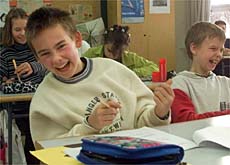
School structure blamed for poor literacy

To improve poor literacy among pupils, Switzerland should abandon its policy of separating children according to their academic ability.
That was one proposal made at two-day conference of teachers, experts and education bureaucrats in the city of Aargau.
Rather than divide students into academic and non-academic streams at an early age, Switzerland’s education system should allow more flexibility.
Student literacy has become a hot political topic in Switzerland after the publication of a study by the Organisation for Economic Cooperation and Development (OECD) found that Swiss standards have fallen well behind those of other developed countries.
As many as one in five Swiss 15-year-olds can read and understand only basic texts – one of the worst rates in the OECD.
Need to improve
The study involved some 250,000 teenagers in 32 countries and highlighted how countries like Britain, Finland, Japan and Korea have been successful at furnishing students with good literacy skills.
Switzerland’s poor showing has triggered a broad debate among educators about how best to improve standards.
According to Andreas Schleicher, who heads the OECD’s programme for International Student Assessment, which the produced the report, differences between average countries like Switzerland and leaders like Finland are obvious.
“If you look at the most successful education systems, you do find that in the past ten to 15 years they have undergone a major transformation,” Schleicher told swissinfo.
“They have gone from working on inputs – what we spend on education and how we organise education – to orienting education [based] on the outcomes of learning,” he says.
Goal-oriented
“We don’t need to start by talking about how many chairs and teachers we need… but by asking ‘what are the goals of education?’.”
“That’s what has happened in Britain, Japan and Finland.”
Schleicher also points out that high-performing countries avoid segregating their students – something Switzerland does at an early age.
“When you divide students up very early between different school types, it’s very hard to correct those decisions later on.
“The OECD study [shows] we are very bad at judging the potential of young people. We tend to sort them simply by their social background…and that is a complete waste of human capital.”
Warning signs
The conference also heard warnings from Pirjo Linnakylä – from Finland’s university of Jyväskylä – that Switzerland must take its problem seriously, particularly the poor literacy rates of the bottom 20 per cent of students.
“We have to face those students… if not today, then later,” Linnakylä says. “Unemployability and reading literacy are very closely related.”
Urs Schildknecht, from the Swiss Association of Teachers, says the Swiss education system is in need of a thorough rethink.
Schildknecht says Switzerland needs to consider how much it pays for education, the way it educates its teachers and how schools are to be structured.
By Jacob Greber
To help combat poor literacy levels, it has been suggested that Switzerland should stop the academic streaming of pupils.
The proposal, made at an education conference in Aargau, is in response to a study by the Organisation for Economic Cooperation and Development (OECD), which showed that literacy levels in Switzerland were lagging behind other developed countries.
According to the OECD, the best performing countries have goal oriented education systems and no longer segregate pupils.
The study has contributed to the debate among Swiss educators as to the value of the present Swiss school system.

In compliance with the JTI standards
More: SWI swissinfo.ch certified by the Journalism Trust Initiative





























You can find an overview of ongoing debates with our journalists here . Please join us!
If you want to start a conversation about a topic raised in this article or want to report factual errors, email us at english@swissinfo.ch.